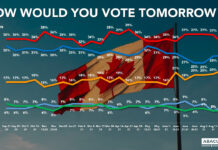BY BRUCE ANDERSON & DAVID COLETTO
Abacus Data Inc.


Photo by Chandra Bodalia

JUST over 19 million Canadian adults (69%) intend to watch at least one leaders’ debate this fall, including almost 6 million (21%) who say they will watch as many as possible, according to results in our survey. The audience will be spread across the country and will include slightly more men and older people than women and younger people. Equal proportions of the voters who will consider each of the three largest parties say they will watch.
A total of 49% of those we surveyed this month said they were certain to vote but were not fully committed to any party yet. Among this group 69% say they will watch at least one debate, and 15% will watch as many as they can. These debates may well turn to be more decisive in the election outcome than usual.
When informed that Prime Minister Stephen Harper will attend several debates but not those hosted by CBC, CTV, and Global, the majority (62%) believes the networks should host debates anyway. This includes 40% of those who intend to vote Conservative, and 51% of those who are considering supporting the CPC. Women are particularly of the view (67%) that the debates should be held despite the PM’s absence.
74% say PM should attend network debates
A large majority (74%) believes the PM “should change his position and attend the debates hosted by the networks as they reach the largest audience”. Only one in four (26%) are persuaded by the argument that “as long as he is participating in some debates he is entitled to decide which debates he wants to be part of.”
This view is held by 63% of CPC voters and 65% of those who say they will consider voting CPC. Among those certain to vote but not yet committed to a party, 74% say the PM should reconsider.
POLITICAL AD TESTING
We measured reactions to four different ads (2 CPC ads, one LPC and one NDP ad). In each case, we asked if the topic of the ad is important, if the audience agreed with the points being made, if the ad built support for the sponsor, and if the ad is fair or unfair.
Topic importance
Of the four ads, three of them scored very well for dealing with important topics (NDP Bring Change to Ottawa 81%, CPC Proven Leadership 68%, LPC Fairness Plan 65%). The CPC Interview Ad that focused on Justin Trudeau and finished with a comment about his hair was considered to be addressing an important topic by considerably fewer people, 51%.
Agree with points made
Large majorities agreed with the points made in the NDP ad (85%), the LPC ad (75%) the CPC Leadership ad (70%). Only 47% found themselves agreeing with the CPC Interview/Hair ad.
Impact on Support
The NDP (+30 net – more inclined minus less inclined) and the Liberal Party ad (+18) were the most likely to result in increased support.
The CPC Proven Leadership ad produced 50% more inclined and 50% less inclined for a net of 0.
The CPC Interview/Trudeau Hair ad had a negative 29 net score, with 36% saying it made them more inclined to support the Conservatives and 65% saying it had the opposite reaction.
Tone / Fairness
Three of the four ads were considered fair by large majorities (80% plus) of those surveyed. Less than half (41%) considered the CPC Interview Trudeau Hair ad fair, while 59% felt it “crossed the line and was unfair”.
The upshot?
Advertising and leader debates will likely be vitally important in this election campaign. A very large number of people say they will watch the leaders debate and several million voters say they will watch as many of the debates as they can.
Most prefer to see the network consortium proceed with debates even in the absence of the PM, and most voters don’t agree with the PM’s decision to skip the major network debates.
If the race continues to be as close as it is now, Mr. Harper and his advisors may regret the decision they’ve taken, and / or reconsider their position. It’s hard to see the upside in being absent, and easy to see the risk of appearing arrogant by not showing up.
When it comes to advertising, the NDP and Liberal messages as well as the Conservative leadership ad have landed well, and show that many people are receptive to the core messages that the three parties are working with.
However, the results offer a reminder to the Conservatives that while negative ads may have worked in the past, they carry risk at this point in the life of this government. Even if attack ads aimed at Mr. Trudeau have some impact on the views of the Liberal leader, they may not result in more support for the Conservatives – instead they could increase the desire for change.












